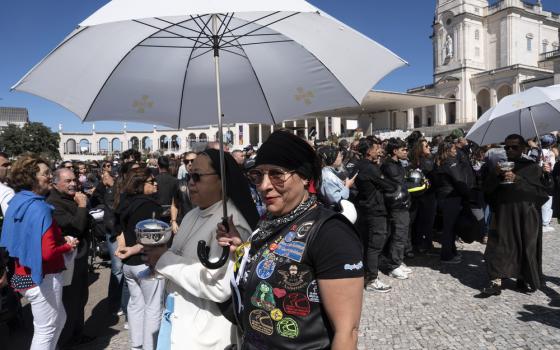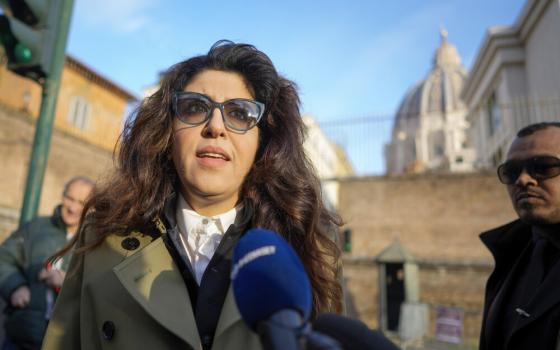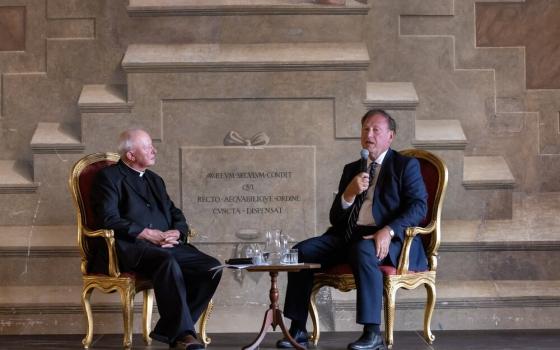Democracy and market economies go hand-in-hand but are risky and can be abused if they do not sustain human dignity and support the common good, according to a Vatican economic official.
Joseph F. X. Zahra, a Maltese economist who is deputy coordinator of the Vatican Council for the Economy, spoke at a U.N. side event Feb. 8 on "Market Economies: Insights and Warnings of Catholic Social Teaching."
"An economic system is a theoretical piece of work unless we put people into it," Zahra said. Its results depend on people and whether they are using or abusing the system.
Economic systems are operated by people and should be based on principles of freedom and dignity, he said. The people administering the systems must focus on the long-term impacts of their decisions instead of the short-term rewards.
Contemporary financial and economic systems, challenged by globalization, inequality, social liberalism and the financial meltdown of the last decade, should be reformed to be more virtuous and reinforce human dignity and human rights in the service of freedom, Zahra said.
The event was sponsored by the Permanent Observer Mission of the Holy See to the United Nations and the Centesimus Annus Pro Pontifice Foundation USA, the U.S. arm of a Vatican foundation that promotes the implementation of the principles of Catholic social teaching.
In his address to the U.N. General Assembly Sept. 25, Pope Francis focused the world's attention on the "vast ranks of the excluded," people who are "cast off by society" because of disability, lack of education, technical expertise or political clout. The pope said the world demands concrete steps and immediate measures be taken to end the social and economic exclusion and acknowledge the humanity of those who struggle in poverty.
Zahra said Catholic social teaching in the past 125 years has responded to the challenges and economies of the times by insisting that "good governments and good economic systems foster human dignity, solidarity and subsidiarity."
He traced Catholic social doctrine beginning with Rerum Novarum, Pope Leo XIII's 1891 encyclical on capital and labor, through Centesimus Annus, St. John Paul II's 1991 encyclical on social and economic justice, and Caritas in Veritate, Pope Benedict XVI's 2009 encyclical, to Pope Francis' 2015 encyclical on the environment, Laudato Si'.
Zahra said, "What Rerum Novarum provided 125 years ago needs to be reapplied to a changing environment. Centesimus Annus provided a reflection on the failure of another economic system; Caritas in Veritate stressed the importance of the human person in the system and in Laudato Si', Pope Francis addresses today's world and urges that people be given a chance to develop what has been given to them."
Centesimus Annus affirmed the value of the market economy and established the need to maintain vibrant and critical interaction among economics, culture and politics, he said. Culture, and specifically family and life issues, are important social concerns.
An objective of Catholic social teaching is the common good, which includes respect for the person, the social well-being and development of both the individual and the person within society, and attainment of peace and security through morally acceptable means, he said.
Zahra said today's society is challenged by globalization, technological developments in the workplace, a disintegrating barrier between personal and work life, inequality, social media, sluggish economic growth and social liberalism. He said social liberalism is "the victory of vice over virtue -- selfishness, greed, suspicion and coercion over common benefit, generosity and trust."
In addition, Zahra said the modern world faces consumerism, environmental degradation, alienation and indifference, and relativism. "The problem is people and culture, not the economic system," he said.
"The pathologies eating away at our society and our environment are the fault of ethical and cultural systems, not economic ones," Zahra said.
He quoted Pope Benedict in Caritas in Veritate, "the conviction that the economy must be autonomous, that it must be shielded from influences of a moral character, has led man to abuse the economic process in a thoroughly destructive way."
Zahra said there is no practical distinction between a man or woman at home and the same person at work. "The human person is one single person" who is active in the economy.
"The monstrosity of social decay, poverty, marginalization is a result of human abuse of the economy," Zahra said.
Catholic social teaching calls for inclusion and equality, and structures that respect the human person and human dignity. The preferential option for the poor described in Centesimus Annus addresses material, moral and spiritual poverty.
Zahra said Pope Francis provokes people to re-think and reform the economic system to solve the social problems caused by its misuse and abuse. This is accomplished through "solidarity, which allows people to become artisans of their destiny," and includes ethical decision-making by businesses and consumers, as well as long-term investment to achieve the common good, he said.
Msgr. Joseph Grech, first secretary of the Vatican's U.N. mission, said the United Nations' 2030 Agenda for Sustainable Development, "Transforming Our World," is an important sign of hope. It responds to the needs of the suffering, advocates equal rights to economic resources, promotes development-oriented policies and full employment, calls for the eradication of child labor and the protection of all workers, including migrants, he said.




